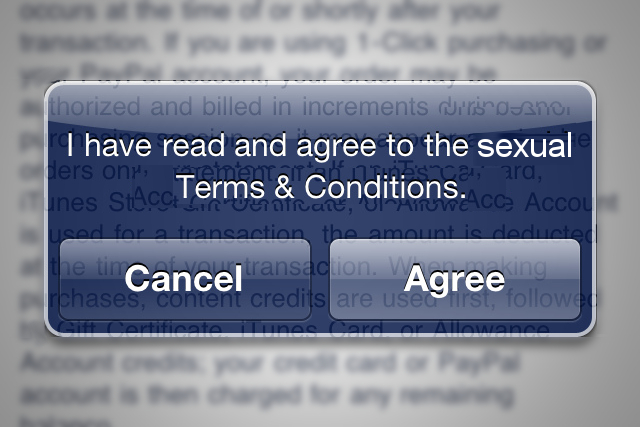Because consent is more slippery than a yes/no before-sex contract.

I consider myself a generally well-read, up-to-date person. Often this is to my own detriment, as I usually know the exact reason that the world is on fire, or the newest thing that should make me despair about humanity. It also makes me a total buzzkill. Whether I’m explaining why we should stop using helium balloons if we want to be able to use MRI’s in the future, or pointing out that Santa Claus shares a lot of characteristics with abusive partners, I can be counted on to provide an informed, depressing reality check. Which is why it’s actually a little bit surprising that I find out something new and weird about the world that I didn’t actually know. Especially when it’s something that I really should have known. Case in point: someone having the bright idea to create an app for consent.
Consent is something that is both incredibly simple and functionally complicated. Far beyond the old, over-simplified “no means no,” we’ve moved on to “yes means yes.” Consent has to be affirmative (silence does not equal a yes, only yesses or other signs of affirmation equal a yes) enthusiastic (not the result of coercion, badgering, or other negative action, but rather something the person genuinely wants) and sober (you legally cannot consent if you are under the influence of drugs or alcohol). Admittedly, this can look a little weird in practice, and often requires a lot of communication between partners—a nod can be a yes, as can other body language. Sometimes consent is not a super formal “Is it acceptable if I insert my penis into your vagina right now?” but rather a “Are you ready?” or “Is this okay?” The idea of affirmative consent is new for a lot of people, and many people who haven’t been practicing it can be understandably confused. But that confusion is no excuse for the dumb idea of turning consent into a literal contract.
Reina Gattuso does an admirable job of explaining the many reasons that a consent app is a bad idea, but they really boil down to one point: consent cannot, and should not, be reduced to a contract. Consent is a mobile concept—I can think that I will be okay with something, only to change my minds moments later. I can be okay with something on Tuesday and not okay with it on Wednesday. And while there is nothing wrong with going over lists of activities with a partner and deciding what you do and don’t feel comfortable doing, you should never feel beholden to that list.
I can’t get over the sensation that a consent app serves the same purpose as a non-disclosure agreement—a way to cover the ass of the person doing the bad thing, and not really anything helpful for the person who is likely to be hurt. I can easily see consent apps and consent contracts being used in court to paint a rape survivor as a flip-flopping liar, or used to pressure a survivor to stay silent. Let’s just not, okay?
Signed: Feminist Fury
***
Featured image of “terms and conditions” based on: bfishadow, CC BY 2.0
